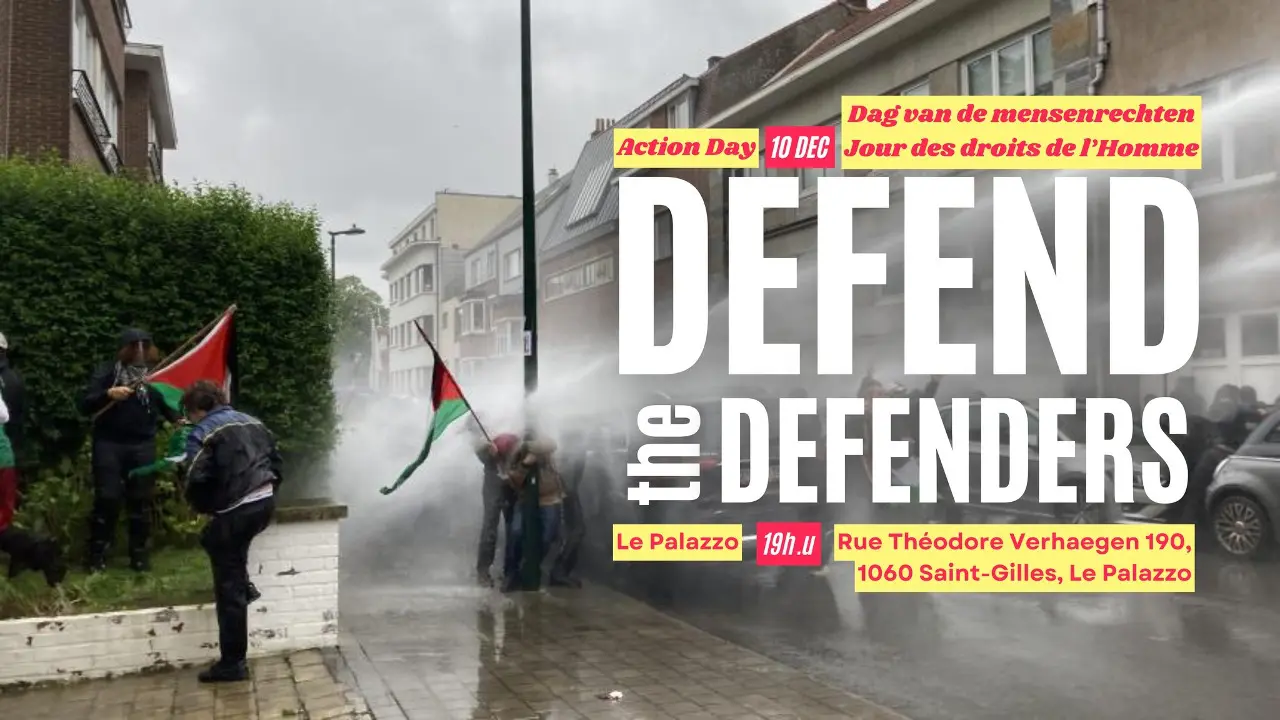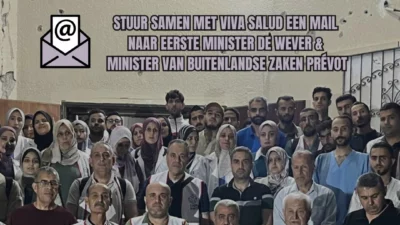Defend the Defenders open letter
The situation in Palestine remains unprecedented, with the ongoing genocide against 2.3 million Palestinians in Gaza and systematic violations of fundamental rights across the West Bank, East Jerusalem, and the 1948 territories. This intentional destruction of Palestinian life has sparked global solidarity, with people worldwide standing in support of their struggle for justice and liberation
Defend the Defenders, a coalition of unions, grassroots organizations, and NGOs, gathers annually on December 10th, Human Rights Day, to shed light on the persecution and oppression faced by unions, workers, activists, and social movements. This year, the coalition will focus on the repression of the Palestinian solidarity movement, alongside other critical cases from across the globe.
Context
Generally speaking, social movements across the globe are facing an alarming wave of repression. In Belgium, this trend is evident in the targeting of unionists. Workers at Delhaize, for instance, have faced severe retaliation for their actions, including threats and
fines enforced by court-appointed bailiffs. The law proposition “Van Quickenborne” that was ultimately beaten and did not pass sought to significantly restrict the right to protest. Belgium’s likely next government “Arizona” plans to further encroach on the rights of unions and civil liberties.
All across Europe, the repression of social movements is intensifying, with solidarity for Palestine particularly targeted. Activists face police violence, legal attacks, and criminalization, such as against the Boycott, Divestment, and Sanctions (BDS) campaign.
This escalating crackdown on social movements reflects a systematic effort to erode freedoms and silence those who advocate for justice and equality.
Specific cases
In Belgium the student movement for Palestine is facing increasing repression, including surveillance and disciplinary measures, simply for voicing their support for Palestinian rights and calling on their universities for implementing international law by demanding an academic boycott of Israel. Over 90 individuals have been targeted by law enforcement under the suspicion of belonging to a group advocating for segregation and racial discrimination. Many of these individuals are at risk of expulsion from their university and severe legal repercussions.
The rise of the far right in Belgian society can be seen and felt through the attacks on union rights. The Arizona coalition supernote details planned legal measures to suppress dissent and limit workers’ rights. A proposal is being made to grant unions juridical status and mandate the public disclosure of their financial accounts. This would increase state and corporate control over union activities and undermine their independence. In February 2024, a new law was passed that criminalizes criticism of the Belgian state, further restricting freedom of expression and protest.
In France workers and activists have been subjected to harsh repression due to their solidarity with Palestine. In the past year, hundreds of people have been accused of “apology of terrorism” simply for showing solidarity with Palestine or criticizing Israel. For example, Jean-Paul Delescaut, the General Secretary of CGT-Nord, was condemned to a one-year suspended sentence for “apology of terrorism” after publishing a leaflet denouncing Israel’s attacks on Gaza.
In the Philippines, human rights are also under serious threat. In one year, 89 murders, 13 disappearances, and 207 illegal arrests have been recorded, with approximately 799 political prisoners currently detained. Despite these repressive conditions, Filipino activists continue to bravely defend trade union and human rights. Palestinian civil society actors, including unions, activists, and other organizations, are systematically targeted by the Israeli occupation, facing arrests and violence. Since October 2023, thousands of Palestinian workers from Gaza were deported with a minority who have been arrested, many have been killed and a large number of Palestinian workers are still missing. Additionally, all their financial rights were collectively stripped away. Transportation workers in the West Bank are on the front lines of confrontation with the occupation, and not a day passes without them being arrested and mistreated. The Palestinian General Federation of Trade Unions, PGFTU, plays a critical role in defending the worker’s right to decent work and following up on urgent issues they face.
Additionally, six prominent Palestinian civil society organizations have been designated by the illegal Israeli regime as terrorist organizations without any proof in order to target their work. One of the designated organizations is the Palestinian Union of Agricultural Work Committees (UAWC) that defends the rights of Palestinian farmers. Each year during the olive picking season there is growing tensions among Palestinian farmers and Israeli settlers who seek to intimidate them, steal their harvest and physically harm them. By criminalizing these six organizations, who represent all major sectors of Palestinian life, the harassment against human rights defenders and shrinking space for Palestinian civil society increase.
Impact of repression
The repression of social movements and unions has far-reaching consequences that extend beyond the immediate suppression of dissent. At its core, this repression undermines the role of civil society and threatens the protection of fundamental rights. By targeting activists, workers, and unions, the state not only silences important voices but also weakens the fabric of democracy itself. A healthy democracy relies on the active participation of its citizens, the protection of fundamental freedoms, and the ability to challenge systems of power. When social movements and unions are repressed, these essential components are eroded, leaving society vulnerable to authoritarianism. Social regression, as exemplified by the Arizona coalition’s proposed measures – undermining union rights, limiting civil liberties, and suppressing free speech – is inherently tied to increasing repression.
Conclusion
The Defend the Defenders coalition wants to remind that a healthy democracy goes hand in hand with the respect of international law. By repressing activists and unionists who express international solidarity with the people of Palestine and elsewhere in accordance with international law, western governments are undermining the exercise of democracy.
This is why we :
- Appeal to the Belgian government’s responsibility to uphold and defend human rights.
- Call for the rejection of repressive laws and measures aimed at limiting the actions of unions and activists.
- Insist on concrete actions for Palestine, urging Belgium to actively work to end the occupation, colonization, and repression of the Palestinian people in line with international law.
- Urge Belgium to fulfill its obligations under international law, including the prevention of genocide and adherence to the ICJ rulings.
- Demand that Belgium support the ICC in its case against the perpetrators of the Palestinian genocide.
- Call on Belgium to protect human rights defenders by using diplomatic and political means to ensure their safety and freedom.

